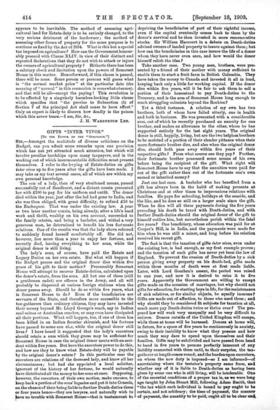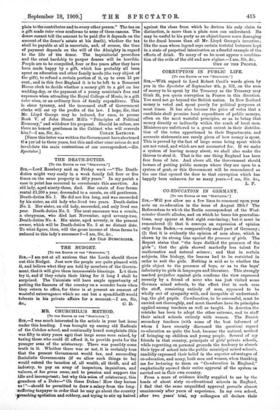GIFTS "INTER VIVOS."
[To THE EDITOR OP THE " SPECTATOR:9
SIB,—Amongst the multitude of diverse criticisms on the Budget, can you admit some remarks upon one provision which has not yet attracted much attention, but which will involve peculiar hardships upon many taxpayers, and in the working out of which insurmountable difficulties must present themselves. I refer to the levying of Estate-duties on gifts inter vices up to five years after the gifts have been made. I may take as my text several cases, all of which are within my own personal knowledge.
The son of a lady, then of very straitened means, passed successfully out of Sandhurst, and a distant cousin presented her with 2100 to pay for his uniform and outfit. The donor died within the year, just after the lad had gone to India, and she was then obliged, with great difficulty, to refund 210 to the Exchequer. That was under the existing law. A year or two later another cousin, being already, after a life's hard work and thrift, wealthy on his own account, succeeded to the family estates, and being a bachelor, and withal a very generous man, he determined to benefit his less fortunate relations. One of the results was that the lady above referred to suddenly found herself comfortably off. She did not, however, live more than a year to enjoy her fortune, and recently died, leaving everything to her sons, while the original donor is still living.
The lady's sons, of course, have paid the Estate and Legacy Duties on her own estate. But what will happen if the Budget passes and the original donor dies within five years of his gift to their mother ? Presumably Somerset House will attempt to recover Estate-duties, calculated upon the donor's estate, from the sons. All but one of these (still a gentleman cadet) are officers in the Army, and all will probably be dispersed at various foreign stations when the donor passes away. Should he do so within five years, what is Somerset House to do ? Even if the beneficiaries are servants of the State, and therefore more accessible to the tax-gatherers than ordinary citizens, they may have invested their money beyond Mr. Lloyd George's reach, say in Indian coal-mines or Australian ranches, or may even have dissipated all their portions. What will happen, too, if one of them has been -killed in an Indian frontier skirmish, and his fortune have passed to some one el.e, while the original donor still lives P I have heard it suggested that the lady's executors should retain a sum which they guess may be sufficient for Somerset House in case the original donor meets with an acci- dent within five years. But have the executors power to do this, and how are they to know what Estate-duty will be payable by the original donor's estate ? In this particular case the executors are relations of the deceased lady, and know all her circumstances ; but bad she appointed a local solicitor, ignorant of the history of her fortune, he would naturally have distributed all the money to her sons at once. Supposing, however, the executors, of their own motion, make excuses, to keep back a portion of the sons' legacies and put it into Console, on the chance of their being liable to further Death-duties three or four years hence—they are lawyers, and naturally wish to have no trouble with Somerset House—that is tantamount to depriving the beneficiaries of part of their rightful income, even if the capital eventually comes back to them by the donor's survival and be then invested in more remunerative stocks. Sir William Harcourt in a debate on Death-duties advised owners of landed property to insure against them ; but how can the beneficiaries in this case insure the life of a donor whom they have never even seen, and how would the donor himself relish the idea P
Take another case. Two young men, brothers, were pre. rented by a friend of their mother with money sufficient to enable them to start a fruit farm in British Colombia. They have taken the money to Canada and invested it all in land, keeping back only a little for working capital. If the donor dies within five years, will it be fair to ask them to sell a portion of their homestead to pay Death-duties to the Treasury, and is the arm of Somerset House long enough to reach struggling colonists beyond the Rockies P
Yet a third instance. A relation of my own has two brothers, both of whom have failed utterly, one in health and both in business. He was presented with a considerable sum, out of which he recently purchased an annuity for one brother, and makes an allowance to the other, whom he has supported entirely for the last eight years. The original donor is still, happily, living, but are the two helpless brothers to be mulcted of a portion of their slender pittance when their more fortunate brother dies, and also when the original donor dies, should both pass away within five years of their respective gifts ? From what source can they pay P Further, their fortunate brother possessed some means of his own before being the recipient of the gift. What right will Somerset House have to say that the annuities were paid for out of the gift rather than out of the fortunate one's own earned or inherited money ?
Just one last case. A bachelor who has benefited from a gift has always been in the habit of making presents at Christmas and at other times to impecunious relations with families. He pays for schooling, holidays at the seaside, and the like, and be does so still on a larger scale since the gift. When he dies will all these payments during the five years preceding his death be taxed with Death-duties, and with further Death-duties should the original donor of the gift to himself outlive him, but nevertheless perish within the fatal five years P One beneficiary, whose education was paid for at Cooper's Hill, is in India, and the payments were made for him when he was still a minor, and long before his relation received his recent gift.
The fact is that the taxation of gifts inter visor, even under the existing law, is bad enough, as my first example proves ; and the taxation of such gifts has never yet been the law of England. To prevent the evasion of Death-duties by a sick person giving away property on his death-bed, gifts made within three months of death were at first made liable. Later, with Lord Goschen's assent, the period was raised to one year, and now it is desired to raise it to five years. Apparently the Government are willing to except gifts made on the occasion of marriages, but why should not gifts for education, for starting boys in life, for the maintenance of sick relatives, or for similar objects, be equally immune P Gifts are made out of affection, to those who need them ; and why should they he considered fit subjects for taxation at all, much more pay Death-duties twice or thrice over P The pro. posed law will work very unequally and be very difficult to enforce. Donees outside of the United Kingdom will escape, while those at home will be harassed. Donees at home will, in future, for a space of five years be continuously in anxiety, owing to their inability to know what they possess and how much they may dare to spend upon themselves and their families. Gifts may be subdivided and have passed from hand to hand in five years to persons perfectly innocent of any liability connected with them until, to their surprise, the tax. gatherer at length comes round; and the burdenupon executors, on whom the new duty is imposed—so I am informed—of ascertaining where the -testator's property came from, and whether any of it is liable to Death-duties as having been given by some one who is still living, will be intolerable. Otte of the essential conditions of a proper tax is, as we were long ago taught by John Stuart Mill, following Adam Smith, that "the tax which each individual is bound to pay ought to be certain, and not arbitrary; the time of payment, the manner of payment, the Quantity to be paid, ought all to be clear and, plain to the contributor and to every other person." The tax on a gift made inter vivos conforms to none of these canons. The donee cannot tell the amount to be paid (for it depends on the amount of the donor's estate at his death), whether the tax shall be payable at all is uncertain, and, of course, the time of payment depends on the will of the Almighty in regard to the life of the donor. The inquisitorial procedure and the cruel hardship to pauper donees will be horrible. People are to be compelled, four or five years after they have been made happy by a gift, which has probably all been spent on education and other family needs (the very object of the gift), to refund a certain portion of it, up to even 15 per cent., and in this free England it is to be left to a Somerset House clerk to decide whether a money gift to a girl on her wedding-day, or the payment of a young musician's fees and expenses when attending the Royal College of Music, is a gift inter vivos, or an ordinary item of family expenditure. This is sheer tyranny, and the increased staff of Government clerks will eat up the profits of the law. I hope, Sir, that Mr. Lloyd George may be induced, for once, to peruse Book V. of John Stuart Mill's " Principles of Political Economy," and withdraw his proposal. Should he refuse, are there no honest gentlemen in the Cabinet who will overrule him F—I am, Sir, &e., CORAM LATRONE. [Since this letter was written the Government have shortened tl e per'od to three years, but this and other conc:ssions do not invalidate the main contentions of our correspondent.—En. Spectator.]











































 Previous page
Previous page